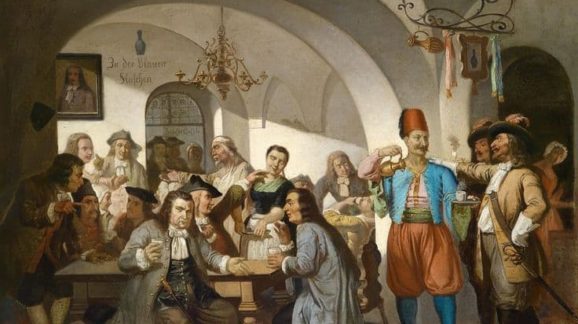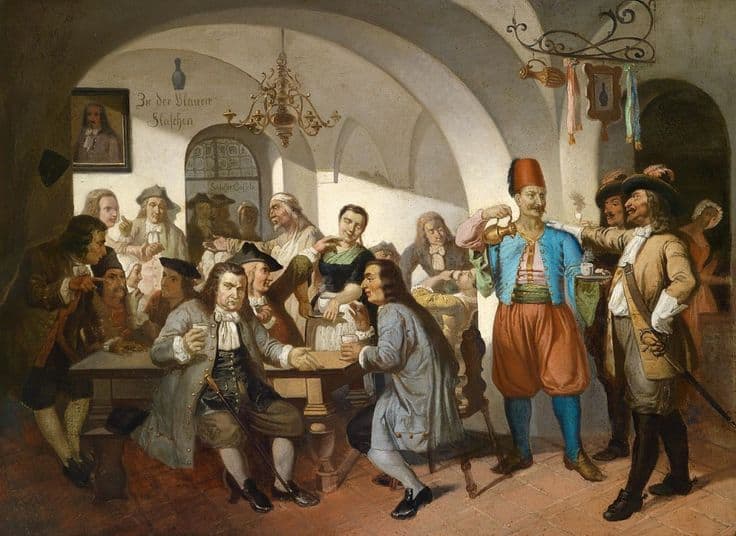Celebrate National Coffee Day

 In the modern American workplace, many people see coffee as essential to productivity and for socializing around the coffee machine, which makes it unsurprising that there would be a National Coffee Day, but coffee is much more than fuel to get through the day. Coffee faces Food and Drug Administration (FDA) regulations on caffeine and the politics of “fair trade.” It could be a path to prosperity to many in developing countries and has a history of facilitating the free exchange of ideas.
In the modern American workplace, many people see coffee as essential to productivity and for socializing around the coffee machine, which makes it unsurprising that there would be a National Coffee Day, but coffee is much more than fuel to get through the day. Coffee faces Food and Drug Administration (FDA) regulations on caffeine and the politics of “fair trade.” It could be a path to prosperity to many in developing countries and has a history of facilitating the free exchange of ideas.
FDA Regulations
The FDA loves to find its way into your everyday life, whether it’s by regulating e-cigarettes, banning harmless pesticides used to grow food, or giving recommendations on how much salt you should eat. Another way that the FDA likes to nanny Americans is by setting guidelines for how much caffeine to consume. According to an August 10, 2012 letter from FDA Assistant Commissioner for Legislation Jeanne Ireland to Sen. Richard Durbin (D-Ill.), the suggested caffeine intake guideline is 400mg per day for healthy adults. In the same letter, the assistant commissioner states the average caffeine content for brewed coffee is 135 mg per 8 ounce serving. At that rate, three cups of coffee will put you over the intake guidelines. I know I and many other people at the CEI office regularly drink more than three cups of coffee, but we have not seen the adverse side effects of caffeine consumption over the guideline.
By setting such a low, vague standard, the FDA has chosen to set a one-size-fits-all policy, which could be considered regulatory dark matter, when it comes to caffeine intake. That could also potentially harm coffee producers, especially those that specialize in highly caffeinated coffee such as Black Insomnia Coffee (468 mg per 8 ounce cup) and Death Wish Coffee (485 mg per 8 ounce cup), and limit the ability of consumers to get the amount of caffeine they want or need.
Fair Trade
Fair trade is a word tossed around quite a bit, especially in grocery stores such as Whole Foods and Trader Joe’s, but according to my colleague Iain Murray, fair trade may not be as fair as many think. While many people choose fair trade over free trade because they believe free trade coffee producers are more likely to exploit workers, research shows that fair trade coffee producers are more likely to be in poverty. This happens because the efficiency and output levels of free trade coffee is much higher than that of organic or environmentally friendly free trade coffee. Another reason fair trade isn’t free is because it promotes protectionism, which stifles job creation and limits worker specialization, which takes away countries’ comparative advantage.
African Development
The continent of Africa has experienced massive demographic change and is expected to double its population to 2 billion by 2050. With growth as substantial as this, the key to African development is economic freedom and human freedom. The development community has often cited the informal economy of Africa, which basically operates outside the rule of law and accounts for 50 to 80 percent of the region’s GDP, 60 to 80 percent of employment, and 90 percent of new jobs, as one of the many reasons for Africa’s lack of economic growth. But what is the root cause of the informality? Many businesses may choose to operate outside the law because of restrictions placed on businesses by government and high taxes that restrict economic liberty. By lifting these restrictions and providing more economic freedom, African coffee producers, which produce a large share of the world’s coffee products, could see increased production, higher wages, and a better standard of living.
Coffee is Freedom
As our friend Matt Kibbe likes to say “Beer is freedom,” I like to say coffee is freedom. Coffee houses have a history of being a place in 17th century London where a free exchange of ideas took place, and they remained that way even after Charles II trying to crush them out of fear of what might come from common people talking about politics. Coffee provides a platform for socializing and sharing ideas with others in the office or in coffeehouses, acts as a case study for onerous FDA regulations, suffers from the misunderstanding of fair trade instead of free trade, and could provide a path to economic development in developing countries.